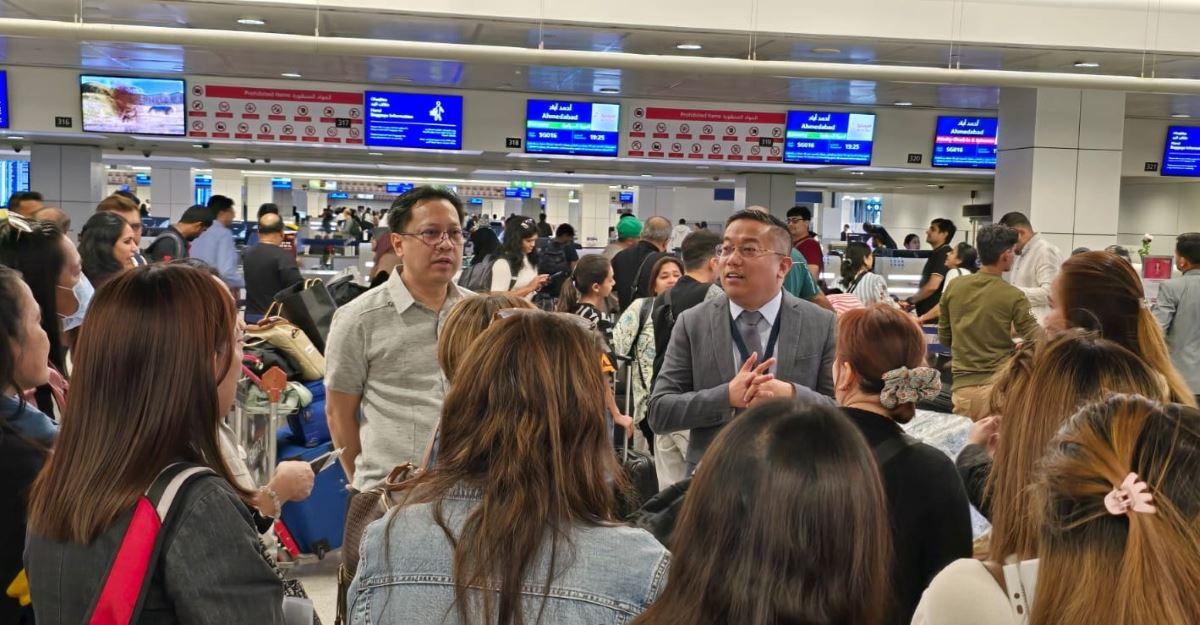
DUBAI, United Arab Emirates – As the cliché goes, if it’s too good to be true, it probably is.
This sums up the warnings by independent Filipino volunteers assisting overstaying fellow Filipinos in applying for amnesty, even as they raised concerns that alleged scammers could be having a field day preying on more desperate kabayans now that the program has been extended for two more months or until Dec. 31, 2024.
As such, these volunteers, drawing from experiences of overstayers victimized in the program’s first two months, raised red flags that amnesty applicants should be on the look-out for.
“Ang pinaka-noticeable is that there is no physical office (The most noticeable is that there is no physical office),” said Cristy Tan Beja, accountant at an oil and gas company, who, along with husband JR has been assisting Filipino overstayers with the program since it began on Sept. 1, 2024.
“Puro Facebook announcements lang at Whatsapp. May iba pa na ang number ay Pinas na number, pero yun ang gamit sa Whatsapp para di ma-trace dito,” she added.
(It’s all Facebook announcements only and Whatsapp. There were also those who used a Whatsapp number from the Philippines to avoid being traced here.)
Another red flag, said Beja, is that the alleged scammer tells a victim that the papers were already being processed, “but no transaction number is given nor proof that the application has been lodged.”
A transaction number, Beja explained, enables an overstayer to monitor progress of the application online, pretty much like how a balikbayan box delivery company, a bank or telecom firm gives tracking numbers to customers.
“If legit kasi, meron ‘yan. Bawat galaw may transaction or reference number na puwede mong i-check lahat online,” said Beja.
(If the company is legitimate, then there should be a transaction or reference number where the applicant can check everything online.)
Still another red flag, Beja said, is that payments depend on the percentage of the application’s completion, not for the whole process.
“Like usually AED2,000 initial payment for Labor, then if this has been approved, another AED2,000 to lodge visa processing. After the visa has been approved, another AED3,000 for medical tests, then a remaining AED1,000 for visa stamping and issuance of the Emirates ID, (EID, a national identification system),” Beja explained.
But she stressed that this can be tricky because strictly by law, only employers can pay for visa processing following submission of three requirements to the government – employment contract, offer letter stating salary among others, and an establishment certificate attesting that the company is legal.
This apparently is also what alleged scammers exploit to victimize overstayers.
“Dapat ang employer ang sasagot ng visa. Ganun ang legit and lawful. But then meron naman kasing iba na hindi makahanap pa ng work, kaya kapit sa patalim para hindi maka-exit at para makapag-stay here. Kaya sila napipilitang bumili,” said Beja.
(The employer should be the one shouldering the costs of visa processing. That’s the legit and lawful way. But there have been overstayers who could not find work and so they take their chances so long as it keeps them from leaving the country and allows them to stay here.)
Other volunteers said alleged scammers promise would-be victims, who usually do not fully understand the whole process, that they would be issued visa provided they make payments.
One of these volunteers, requesting anonymity, meanwhile, said other red flags to watch out for are cheap price, cash payments, third-party referrals and hidden charges.
“They always get back to the victim after having made a first payment, telling them there’s a problem with the application. Then, they will ask for extra charges. A legit company should be able to fix any processing issues,” said the volunteer.
One overstayer who’s finally awaiting issuance of her EID said she had been victimized by an alleged scammer who asked her and other overstaying Filipinos to make a AED2,000 downpayment each for an employment visa.
“Pero two weeks na nakalipas wala man lang siyang naipakitang kahit anong papeles sa’min. Saka hirap na kaming makontak sya,” the victim said, requesting anonymity because she did not want her mother and children in the Philippines to know.
(But it’s been two weeks and he could not show us any papers. Also, we’ve been having difficulty trying to reach him.)
Another victim, also requesting anonymity to avoid his relatives back home from knowing about his situation, said he almost made a payment. “Before po ako nakahanap ng legit na agency, muntik din po ako ma-scam. Buti na lang po down ang system nila at pinabalik ako kinabukasan. In-advise ako na mag-exit. Which is ayaw na ayaw ko pong sumugal. Paano if ma-deport ako, saan ako pupunta?”
(Before I found a legitimate company, I was almost scammed. I was fortunate that their system happened to be down and I was asked to return the next day. I was advised to exit. I didn’t want to make a gamble. What if I was deported? Where would I go?)
There have been reported incidents where overstayers where blocked from leaving or refused re-entry at the airport for insufficient documents.
The amnesty program’s extension was announced on the evening of its supposed deadline on Oct. 31. —KBK, GMA Integrated News




